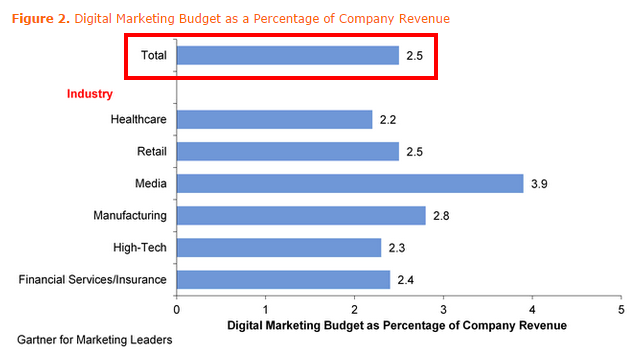

When do you need Digital Marketing?
Oct. 26, 2019, 8:44 a.m.The more important question to ask is “Why do you need digital marketing”. Let us answer that, as per an article published in PC Mag magazine (link), an average adult spends 5.9 hours per day with digital media. Which means 25 % of a day 0r 37% of uptime when not sleeping. Woo.. Doesn’t that answer the question asked in the beginning.
It will not be an understatement to say that if your business does not have an online presence, you simply cease to exist. Your website is the face of your business, and in order to make yourself visible to your target customers, you need digital marketing.
‘As per Gartner Digital Marketing Spend Report:

How do you know when you need digital marketing?
To understand the need, let us answer these questions:
- Are your target customers being in 14 to 40 years age bucket?
- Does your targeted geography have good Internet availability?
- Does your targeted geography have established Internet banking system?
- Do you have limited time to reach to customer from broad geography?
- Do you have budget limitation for GTM strategy (details on GTM Strategy, click here)?
If your answer to3 is Yes, then digital marketing is a good option for you.
Once you have understood the need of Digital Marketing, now it’s important to know the different type of Digital Marketing.
There are 10 basic ways to do Digital Marketing:
- Search Engine Optimization (SEO) : Here when users type any keyword then search engine results pages appear to users after they search for a given set of keywords using a search engine like Google or Bling. Each user receives an individualized results page based on keywords, the user’s location at the time of searching, and their browsing history.
- Search Engine Marketing (SEM): In this you buy a space on the internet to display your advertisement. You get a fix number of views of the page where your advertisement is being displayed. Views don’t mean clicks on your advertisement.
- Pay-Per-Click (PPC): Its same as SEM however you pay for each click from viewer on your advertisement.
- Social Media Marketing (SMM): When you decide to reach your customer via Facebook, Twitter, Snap chat, LinkedIn or any other social media by doing tailored marketing, then its SMM. To use SMM effectively you need to have good understanding of your target customer and their social media behaviour.
- Content Marketing: Content marketing refers to the practice of delivering a quality piece of content to your users to generate sales and leads. This content can live anywhere online. Tweets, a YouTube video, and blogs on your website all comprise of content marketing.
- Affiliate Marketing: Affiliate marketing refers to the process of paying for conversions. Think of it like hiring a sales person for your product or service. That affiliate earns a commission. You determine the rate for affiliate marketing. You only pay for conversion.
- Influencer Marketing: Influencer marketing is among the newer types of digital marketing. Influencer marketing uses people with an enormous online reach considered experts by your target market to drive traffic and sales. Influencer marketing is popular on social media channels like Instagram and Snapchat. Companies hire Instagrammers with large followings to promote their brand by posting one or more photos with the product.
- Email Marketing: Email marketing allows you to update your email subscribers on a regular basis about your company. This fosters a relationship unlike any of the other types of digital marketing. Your email updates provide value to your consumer. As a result, you build brand trust and brand loyalty.
- Viral Marketing: Viral marketing refers to a post of some sort that is trendy, funny, or strange enough to garner a massive number of shares online. Viral marketing causes an enormous spike in website traffic over a short period of time.
- Mobile Phone Advertising: These include SMS advertising which could prove an asset to local marketing efforts. You can prompt your consumers to use SMS to receive special offers, coupons, and updates from your company.
You can use single or multiple ways as per your need.
Got another minute? Check out:


Building a startup that will last

Role of a Mentor in a Start-Up - Contd

Role of a Mentor in a Start-Up

Design Thinking in Innovation

How to analyse competition and prepare for them

Need Of Customer Segmentation and its Impact on strategy

Am I correct? How to check

WHAT DOES MVP HAS TO DO IN STARTUP?

